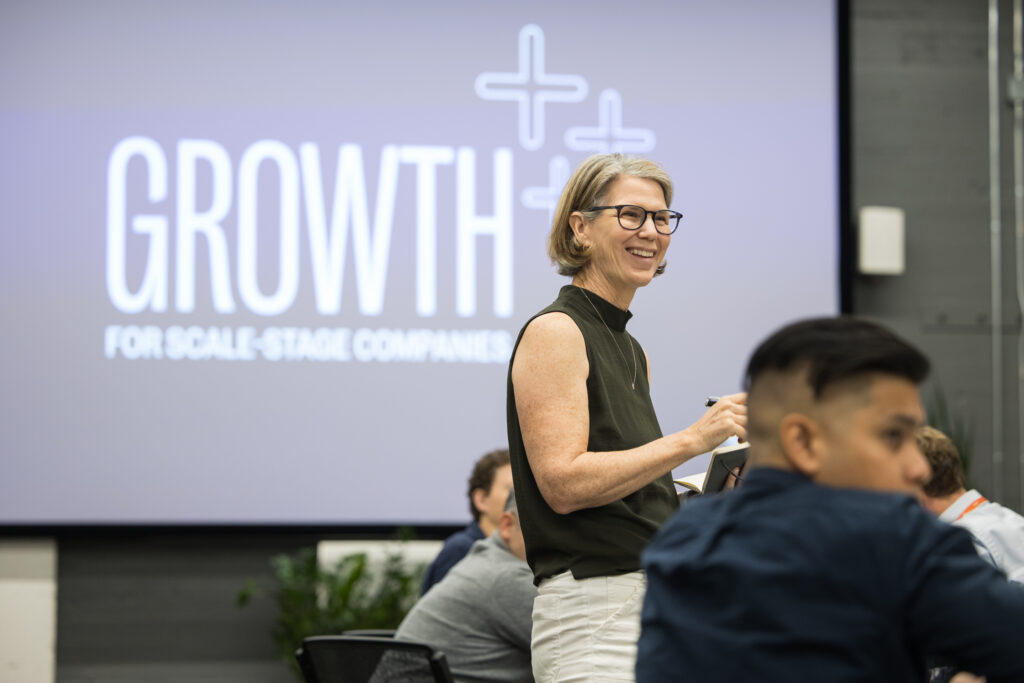Scaling a startup requires more than a great product. It demands a solid strategy, a deep understanding of customers, and alignment across teams.
Last month, C100 hosted a product-focused workshop for its C100 Growth Program companies in Palo Alto, California, where Canada’s leading scale-stage tech founders and executives gathered to learn from Silicon Valley experts. The workshop included sessions covering AI, product strategy, monetization, product management best practices, and customer-driven development. Speakers shared critical lessons to help founders and product leaders design and build products that drive meaningful value for their customers.

Here are the top workshop takeaways shared by our expert speakers Shomit Ghose, Ann Crady Weiss, Thomas Nielsen, Sachin Rekhi, Stef Hutka, Benji Shomair, and Dave Weiss:
- Embrace the Age of AI and Transformative Technology
The workshop started with a discussion on the transformational impact of artificial intelligence (AI) on business. Transformers, the technology behind models like GPT, are driving innovation and reshaping entire industries by enabling a wide range of applications. This century will be known as the century of AI, and startups are encouraged to explore how AI can enhance their products and impact their markets. In today’s business landscape, understanding and leveraging AI is quickly becoming a necessity rather than an option.
- Craft a Compelling Product and Monetization Strategy
Effective product strategies provide focus and help companies make decisions that support long-term success. Fast-growing companies shouldn’t try to innovate on all fronts. That’s a sure way to overextend your staff and risk running out of money. Instead, they should focus only on areas where innovation and uniqueness truly matter to their target customers.

Great products are necessary but not sufficient for a company’s ultimate success. Effective commercialization begins with understanding and growing the value products provide target customers. However, it also requires collaboration across teams, particularly between product and go-to-market (GTM) teams.
- Avoid Common Pitfalls in Product Development
Five common “product traps” frequently hinder company growth:
- The “Blue Button” Trap: Over-prioritizing specific customer requests may detract from the overall vision.
- Deal-Driven Roadmap Trap: Altering the product roadmap based solely on new deals, leading to misalignment.
- The “Everything, Everywhere, All at Once” Trap: Spreading resources too thin by trying to tackle multiple initiatives.
- New Logos vs. Customer Retention Trap: Focusing too heavily on acquiring new customers instead of retaining current ones.
- Cross-Functional Alignment Trap: Lacking a unified approach across teams, which can create silos and slow down decision-making.
A strong product mindset—defined by a commitment to creating meaningful customer value—is essential. By understanding the value products bring to customers, founders can avoid common pitfalls and keep their products aligned with company goals and customer needs.
- Build a Customer-Centric Culture to Deepen Customer Understanding
Several speakers emphasized fostering a customer-centric culture to guide product development. Companies should try to build a deep understanding of their target customer needs based on gathering feedback with a clear purpose. Avoid the “garbage in, garbage out” trap by ensuring how and why your company is gathering customer intelligence. Developing a strong product means staying close to customers, identifying their needs, and maintaining team alignment.
- Create Effective Processes and Foster Team Alignment
Scaling is not just about driving growth. It’s about fostering a culture where teams feel empowered to make decisions that align with the company’s mission. Frameworks for building high-performing teams highlighted the value of cross-functional alignment, a theme echoed by the speakers. By aligning product, GTM, and other critical functions, companies can create a unified culture that drives long-term success.
C100’s Growth product workshop sessions on AI, product and monetization strategies, customer understanding, and team alignment will provide founders and executives with the tools they need to drive product excellence. By aligning their teams, fostering a customer-focused culture, and building products that deliver value, C100 Growth Program companies will be better positioned to thrive in competitive markets and bring Canadian innovation to the global stage.

